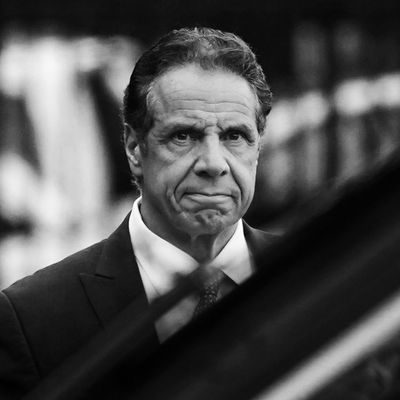
As I watched New York governor Andrew Cuomo’s live address on Tuesday, I thought to myself, Well, we all know how this movie ends. Listening to his familiar excuses — I’m just your typical Italian American who loves a good hug! Back in the Stone Age, it was hilarious to joke with your colleagues about their sex drives! — I steeled myself to watch yet another man dig in his heels and deem himself the latest crusader against cancel culture. Instead, I almost gagged on my tea when Cuomo (eventually) started talking about how the allegations against him, ranging from groping to sexual harassment, might just overshadow the political work that needs to be done. Interesting, I said tentatively under my breath. Do go on. “I never want to be unhelpful in any way,” he continued, which was either a sign that one of the most politically hungry men was epically trolling us all or that he might actually walk away.
When he announced it was the latter, I, like many others, was shocked. Did a man who primarily describes himself with words like fighter and New York tough, a politician notorious for playing dirty and trouncing his enemies at all costs, the same guy who screamed “I’m going to ruin you!” at a journalist and threatened to “destroy” colleagues, really admit defeat? Cuomo’s resignation is remarkable — not because he has proved himself to be a truly remorseful man willing to atone for his behavior, but because the system of accountability that the Me Too movement has been fighting for actually worked. Underneath all of Cuomo’s misogynistic ramblings turned Lifetime Achievement Award–style speech that shows absolutely no personal growth, there is something worth celebrating.
Everybody knows how the workplace-harassment script has played out for decades: Employees, usually women, don’t want to report what happened because what’s the point? Chances are the powers that be will believe the excuses of whatever suit sits at the top of a corporate pyramid, while the allegations in question will be at best dismissed as a misunderstanding or at worst used as an excuse to further harass or fire the accuser. If workers do report any type of abuse, HR departments, forever loyal to the highest earners, may gaslight the victims or quietly pay them out and shut them up with NDAs, as happened with Roger Ailes, Harvey Weinstein, and R. Kelly. Yes, the Me Too movement has started to change this pattern, and a growing cultural awareness that grabbing your employee’s ass isn’t good-ol’-fashioned fun has toppled industry titans like Charlie Rose, Bryan Singer, and Marilyn Manson. Still, many more have clung to power. And when it comes to politics, problematic figures are particularly hard to dethrone. For every swift resignation like those of Al Franken and former New York attorney general Eric Schneiderman, there are men like Brett Kavanaugh, Donald Trump, Joe Biden, and Roy Moore, who have stubbornly stayed and, in many cases, thrived in the political arena despite accusations of sexual misconduct. At times, it has felt as if no mechanism existed to get rid of them and, at a certain point, as though each man were made of Teflon, immune to any allegation and unable to acknowledge any culpability.
But this past winter, rather than defending Cuomo as women first began sharing their stories — of the governor forcibly kissing them, asking them to play strip poker, or inquiring about their sex lives — Democratic allies instead pressured the governor to greenlight an independent investigation with subpoena power, and back in March, they began looking into a possible impeachment. It’s significant that the governor was stripped of any control in the review process and that the person looking into the accusations did not have a conflict of interest. By the time New York attorney general Letitia James announced the damning report in early August that found 11 women had credible allegations against the governor, opening the door to future criminal investigations, his removal seemed like a fait accompli whether he accepted it or not. (The report, it’s worth noting, also found that progressive lawyer Roberta Kaplan had helped Cuomo discredit one of his accusers. Kaplan recently resigned as the chairwoman of Time’s Up.)
Top Democrats, including President Joe Biden, have been calling for Cuomo’s resignation. No one was buying his rebuttal slideshow of photographic “evidence” that he liked to hug various public figures (see? He harasses everybody!) as anything other than a punch line. And it seemed like only a matter of when, not if, he would be pried from office. It felt as if any attempt at a comeback or to further discredit the victims was a moot point. And that instead, maybe a precedent was being set for politicians that even someone as bullish as Cuomo could no longer wave off allegations by calling himself a misunderstood dinosaur. Maybe they would think twice before making that “joke” about a woman’s breasts at work or putting a hand on her knee.
While Cuomo framed his resignation as a public service — “I’ll let the government get back to governing” without “wasting energy on distractions” — the fact that these allegations became the biggest story of his political career is noteworthy. Cuomo still acted like a misogynistic buffoon, undermining his accusers and calling the entire push for his resignation politically motivated, but satisfyingly, it felt like he was shouting into a void. The only words that mattered were “the best way I can help now is if I step aside.” Cuomo may think he’s making a heroic sacrifice to put his city first, but his resignation really means that finally his accusers are the loudest, most credible voices in the room.





